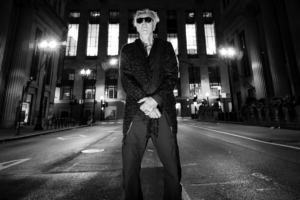DAPHNE GEROGIANNI – The Urban-Romance Of Alternative Rock!

1.How did you get into the music business?
I do consider myself very lucky to have started my music journey through the independent Greek music scene.Alive She Died, my very first band, emerged through a group of friends of my passionate and wild teenage years. I have been writing lyrics since the age of fourteen, so when Alive She Died was formed, there was already enough lyrical material ready. Things developed relatively quickly, and without realizing it we found ourselves performing our first live gig. Soon after we released Viva Voce, an independent production cassette with ‘minimal synth, post-punk’ sound, that was printed in 300 copies.
In my case, the experience of performing live gigs and releasing recordings came first. Some music education classes, and finally a B.A. in Music came much later.
Of course, all these years that I have been involved with music – from the first days of Alive She Died until today – I still hold down regular day jobs to make ends meet. But art has always been a source of vital and decisive power for me, which in difficult times managed to support the world within me.
2. What do you remember from the days of the band Alive She Died?
I remember how anxious I felt before our very first live performance at Pegasus club. And also, that as soon as I got on stage, all my nervousness disappeared and I could only feel the songs.
I also remember moments of effort, creativity, solidarity, and the absolute determination of our friends to help us in any way they could with sound engineering, cover and poster designing, photo shootings, etc…. Making music back then was a romantic process. Because we did not have the technological facilities that are available today, the human presence was the most important factor… Also, the process of listening to music was a ritual on which we spent respectable time… I remember the moments when we at last had the vinyl in our hands and in awe we read the credits carefully and listened to the album just as carefully (usually with the lights off and with absolute dedication!).
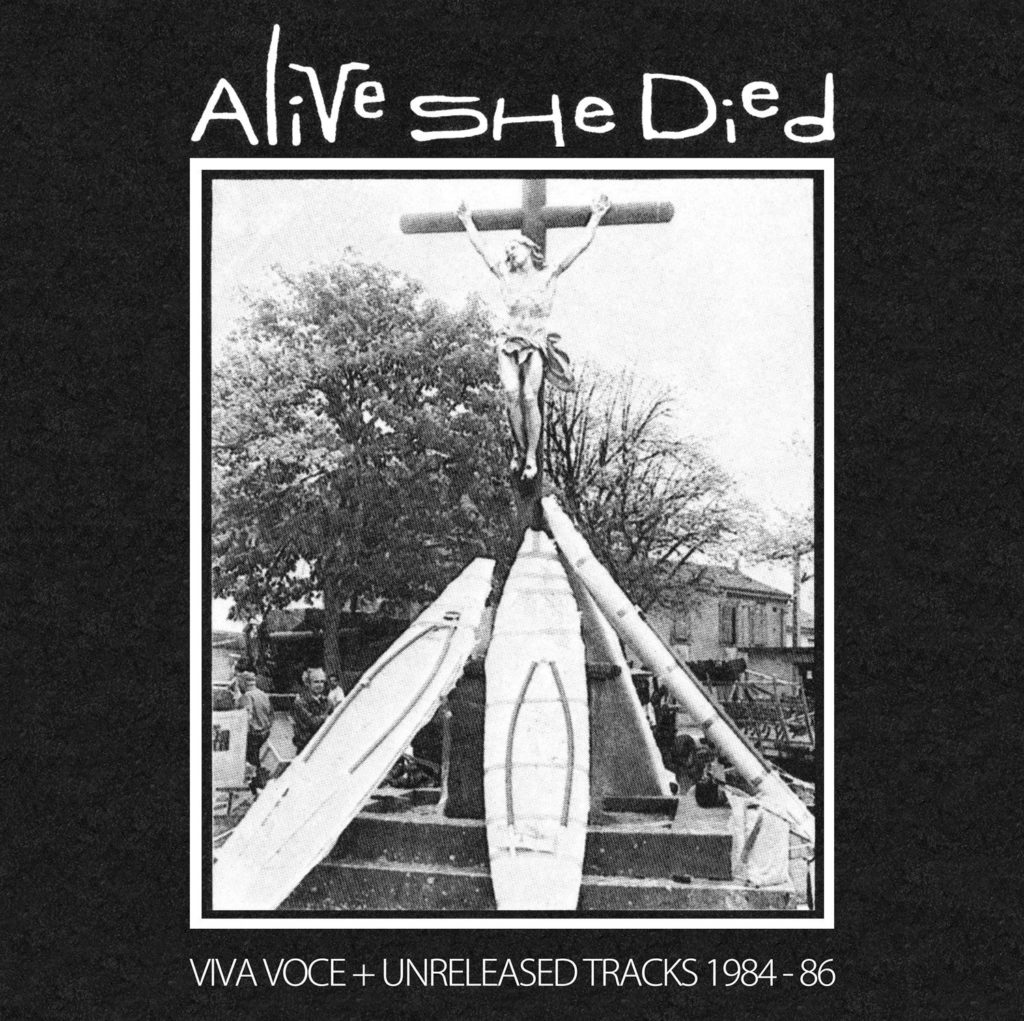
The independent music scene of Athens was surrounded by a dark, innocent, even primitive aura of authenticity. I think this element in itself exerts a charm on those who have not experienced it, and nostalgia on those who have. Possibly this is the reason why there is all this interest lately, both in Greece and abroad, for reissuing recordings of that time.
As Alive She Died we had several offers for the re-release of Viva Voce, which was eventually released on vinyl by Geheimnis Records in March 2017, in 700 hand-numbered copies. This re-release, in addition to the Viva Voce cassette tracks, also includes some tracks from the band’s demos and live performances. Also, in 2010 we had already released “The First Night” (one of the tracks included in the Viva Voce cassette) in the collection titled Genotypes under the German independent label Genetic Music.
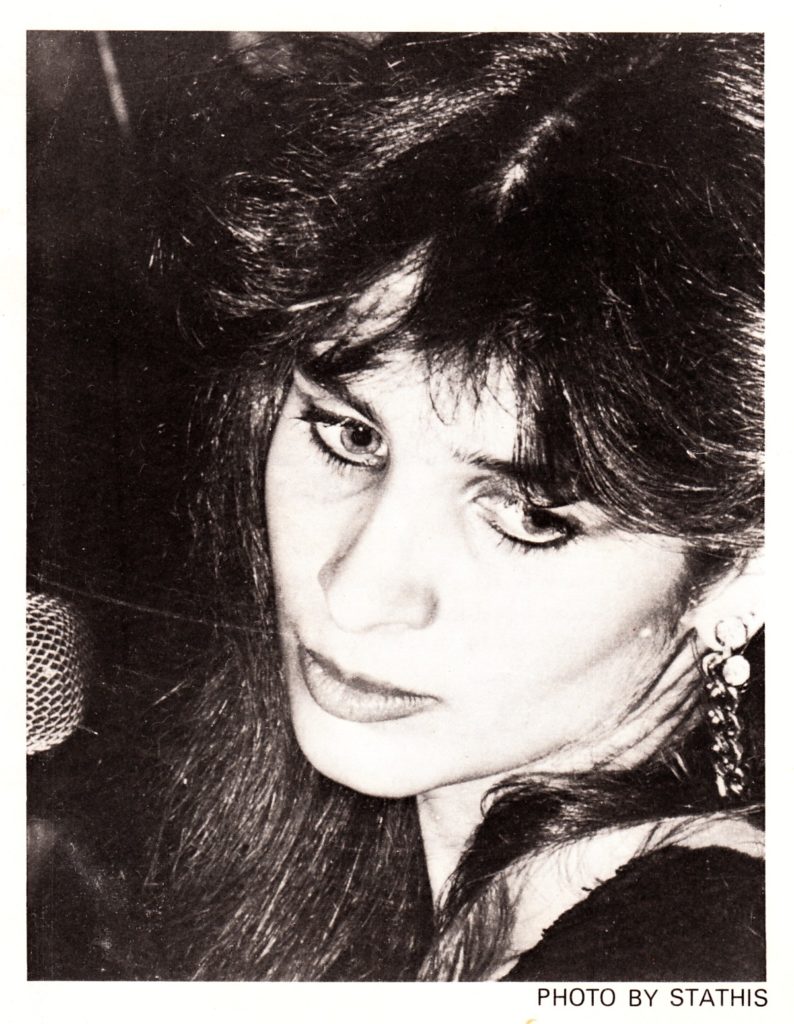
At this point I have to definitely refer to the utmost tribute made on the Greek Minimal Synth and Synthpunk scene: the “Music for Ordinary Life Machines” documentary, a 2018 production, directed by Nikos Chantzis and produced by Press Eject and Give me the Tape . Starting with the underground 80s scene in Greece and travelling up till nowadays, this amazing documentary outlines the Greek music subculture, featuring archive footage and interviews with its key players. As the director himself describes it, “this is a movie about the guys who loved the synthesizers”. And we surely did…
3. The cover of Joy Division’s “She’s Lost Control” by Alive She Died, was selected by the fashion brand Gucci, for their “Cruise 2016 Campaign”. Would you like to tell us the story behind this fact?
Alive She Died’s Viva Voce cassette contained the cover of Joy Division’s “She’s Lost Control”.
In August 2015, Gucci’s legal representative contacted me by phone about the rights to this cover. She found my details through Universal Music and AEPI (The Greek Copyright Company), and asked for permission to use our cover in their “Gucci Cruise 2016” advertising campaign, directed by British fashion photographer and director Glen Luchford.
I still don’t know how they discovered our cover… maybe one of the 300 Viva Voce copies somehow had reached Gucci, or maybe the person who was looking for a cover, stumbled upon it on YouTube where it was uploaded in 2009 by a French user.
It was a romantic surprise that this song was discovered after many years from its first release, to be used by such a big fashion brand. The truth is that the recent years Alive She Died have acquired a ‘cult status’ in the global post-punk eighties music scene. Almost all of the songs have been uploaded online by different users in many countries, profiles of the band have been created on various social media, as well as tributes for the band are formed on sites that engage with this genre. When the cover of “She’s Lost Control” became popular again, the reputable music site sputnikmusic.com included it in the list of the top-ten covers ever made on Joy Division songs, awarding it with the seventh place. Also, discogs.com (the largest vinyl sales site in the world), included Viva Voce in its 100-list of releases of all time that need to be reissued.
4. Did the success of this music placement affect you on personal and commercial level?
On the personal level what happened was that the Gucci ad and the re-issue of Viva Voce triggered a flashback – something like a recapitulation – through which I re-lived an era that no longer seemed so distant… It was like catching the thread of my music journey from the very beginning and joining its pieces up until today…
On the commercial level, it was great that the song received such an abrupt attention by all types of media world-wide. I did receive numerous congrats messages, and was interviewed by several magazines and radio stations. I do remember reading our names even on Japanese musical sites!
Yet, the most touching reference I stumbled upon was the review on the “Sound Injections” blog which reads: “Apparently one of the best covers in a Joy Division song came from a Greek band called Alive She Died. Released only in cassette and heard only from a handful of persons, this cover came into my attention after watching the spot of ‘The Cruise 2016 Campaign’ by Gucci!!!! Yes, you read that right by GUCCI….. Shame on me but so glad I stumble upon it! Play it on repeat until the end of time…”
5. From Alive She Died to Trespass, what did it lead you to form the Trespass band?
Alive She Died’s sound was raw and dark, based on synthesizers and drum machines. Trespass was essentially the evolutionary continuation of Alive She Died. With the addition of new members (George Boussounis on keyboards, Iraklis Anastasiadis on guitar and Giorgos Kolliopoulos on drums), the sound evolved from ‘minimal synth’ to ‘new wave with minor progressive rock deviations’. Trespass released one single LP titled Strange Times and played quite a few gigs at the famous Greek live venue Rodon, with highlights the openings for The Fall and Nick Cave.
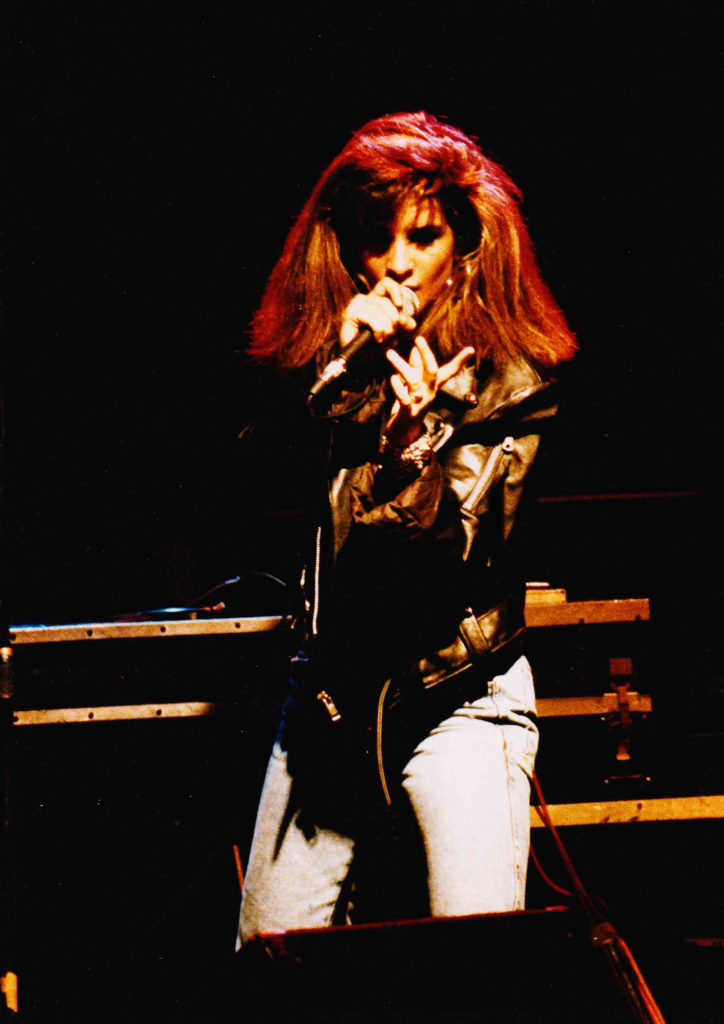
6. The track “Strange Times” by Trespass was aired on MTV in the 80s, how did it happen?
Trespass was featured heavily on the music television shows of the time. Through the radio/TV producer Kostas Sgontzos, came a suggestion from MTV Europe to shoot a test-video for the song “Strange Times”. We did the test-video, sent it, and soon the answer came to shoot a complete video-clip, which we did. Finally, the video of “Strange Times” (accompanied by an interview with Chris Salewicz in front of the Herodion Theatre in Athens, Greece) was to become the first English-language video-clip of a Greek band to be broadcasted by MTV Europe.
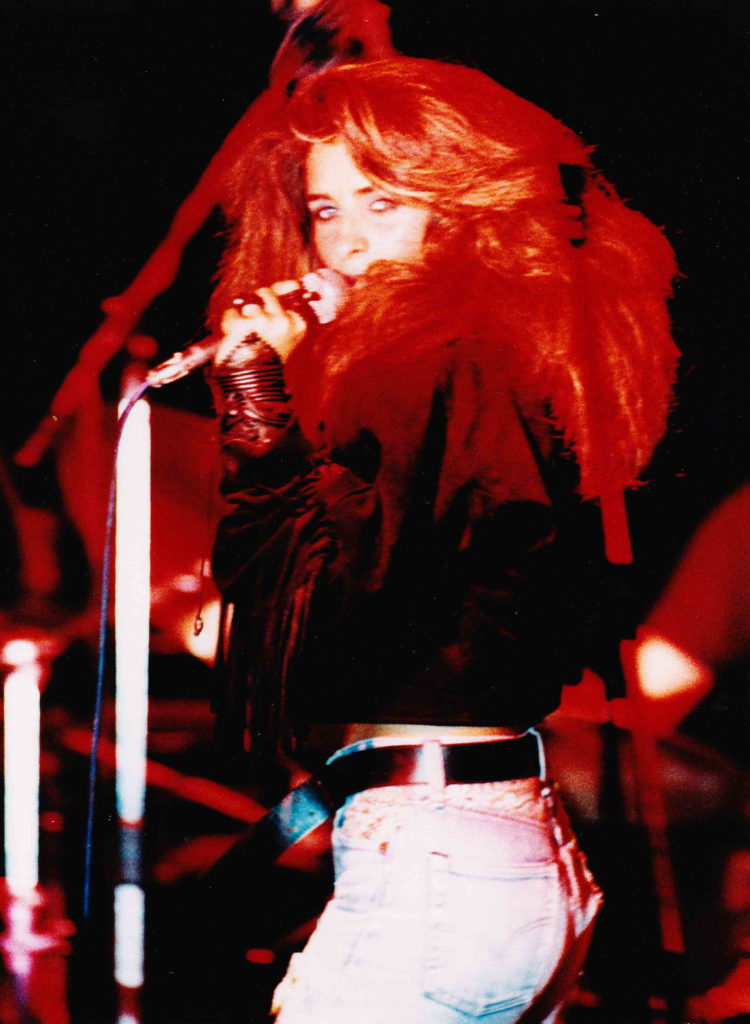
7. Why did you leave from Greece after splitting with Trespass and did you work on music while being abroad?
When – due to internal disagreements – Trespass broke up, I felt deeply hurt. I decided to leave Greece, and not to involve myself with music ever again. I chose to go to New York because it was the city I was seeing in the movies… and I wanted to experience that. And it never disappointed me. I lived there for four years, studying theater in two different schools – my CV also mentions the role of Antigone (both in English and Ancient Greek) in an off-Broadway show. I also graduated as a Fitness Instructor from New York University, and to support myself I did work as a waitress for endless hours at Greek dinners…
8. Did you ever have any second thoughts about not returning to Greece?
Oh yes! I did actually tried, but obtaining the necessary papers for permanent residency proved an impossible mission. Returning to Greece, I continued my theatrical studies at “Vassilis Diamantopoulos” workshop acting studio, and for several years I no longer engaged with music at all.
I certainly miss New York very much, the walks in the streets of Soho where I lived, the sunsets behind the skyscrapers, my morning coffee on the fire-escape balcony of the loft I rented with roommates of different nationalities, my studies, and above all, all the amazing people I met and loved very much.
9. “Atria” and “Atria the Project”, how did you decide to form those bands and what were the main differences between them in terms of line up and music style?
After a few years I have returned from New York and I am no longer involved not at all with music, I met again with Iraklis Anastasiadis (who played guitar in Trespass), who had written some tracks and asked me for lyrics. At first I had a lot of resistance that was soon bent due to the insistence of Iraklis in combination with the musical virus that lives inside me. And so in 2000 we formed Atria, a minimal electronic duet. We performed a lot of live shows, released one LP and two EP’s, and participated in several collections – one of them with a cover of Depeche Mode’s “Photographic”. As Atria, we were very lucky to have experienced opening for names like Pet Shop Boys, Hooverphonic, Mark Almond, Scissor Sisters, Anne Clark and Stereo Mc’s.
When Atria broke up in 2007, there was another pause in my musical career. In 2009 I met with Aris Zarakas (who had played guitars in the recording of the Strange Times album). At first we continued as Atria, performing some gigs, but because our sound had become clearly alternative rock (attributed to Aris guitar playing), we wanted to differentiate it from the old one, and so we renamed the band from Atria to Atria the Project. In the period 2009-2012, we performed several live shows and released five digital singles, including a slightly punk version of the multi-adapted “Bang Bang”.
10. What about your latest single “As My Love”? Please describe the process of recording and composting this track.
“As My Love” was written quite a while before its release, by Iraklis Anastasiadis (music) and me (lyrics).
During the coronavirus two-month constraint (when we all had enough time to do things we love), I decided that it was about time to finish the track. Due to the restrictive measures, all the work (including the production, mixing and mastering) was done online. The song is produced by Manolis Vlachos and released by Ammos Music, available in all major online music stores (iTunes / Apple Music, Amazon, Google Play, Spotify, etc.).
“As My Love” is dedicated to the very special people we meet and fall in love with, breathing from the fire of ‘once in a lifetime’…
11. You have a new album coming out, right? Would you like to talk us about your new work?
Yes, in the right here and now I am in the recording studio working on new songs, on compositions by Iraklis Anastasiadis and Aris Zarakas. My lyrics are mostly dealing with the imperfections and the fragile side of the human nature, darkness and light, love and trouble, fear and faith – all covered by a sense of melancholic victory over them.
The recording team includes: Andy Vickery (guitars), Vinzenz Benjamin (bass), and Phil G (drums) – three British musicians who have collaborated with artists such as Mike and the Mechanics, ABC, Holly Johnson, Go West, Paul Young, Amy McDonald – and Chrysa Tsaltampasi on vocals.
The tracks are produced by George Boussounis and George Ginis, and will be released by Ammos Music.
Expect a new single to be coming out soon!
12. How do you adjust yourself to the current status of the digital music industry?
The way we ‘consume’ music has changed gradually over the last fifteen years. The internet has become an integral part of our lives, and has completely reshaped the music business. We passed from vinyls and CDs to MP3s and streaming.
Adjusting to this status, I release my work on all major online music stores and streaming platforms. The promotion is done through relative websites, social media, and radio stations, since this has become the main way of promoting a musician’s work.
Yet, I sometimes feel very nostalgic about the immediacy and ‘honesty’ of the analog sound. And it makes me somewhat sad that we are giving less and less time to listen and enjoy a song. We very often ‘see but do not hear’, as the image has gained more weight than the music itself…
Personally, I still make sure to devote all the time I feel I need to absorb what I hear…
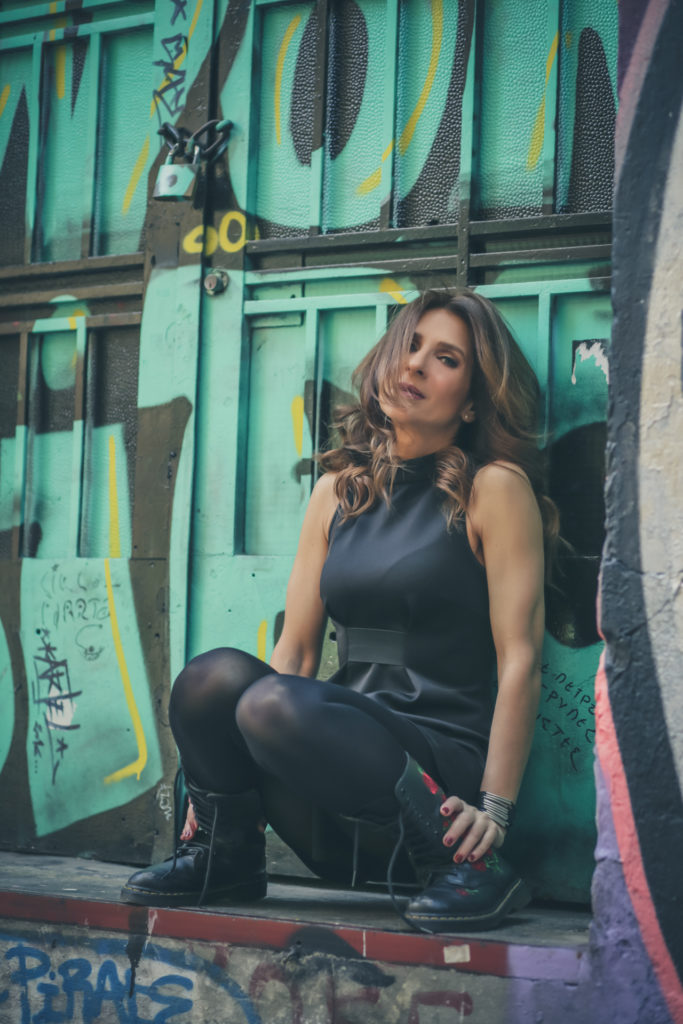
13. What about your next music plans?
In 2016 I decided to close the circle of ‘bands’ and all the emotions that surround it, and to embark on a solo musical journey, which aesthetically I would say moves in a style that I call ‘Urban Romantic’ or otherwise urban / romantic / alternative rock.
At the moment my music goal is to complete the songs that I’m working on, and possibly shoot some video clips. I really miss the interaction of a live performance, but I feel that this won’t be an option for quite a while during the covid-19 era.
LINKS:
https://www.daphnegerogianni.com/
https://www.youtube.com/c/DaphneGerogianni
https://www.facebook.com/aboutdaphne
https://soundcloud.com/daphnegerogianni
https://www.instagram.com/daphnegerogianni/
https://twitter.com/aboutdaphne
Interview photos by Christos Petropoulos


